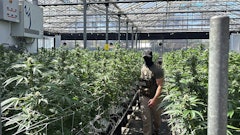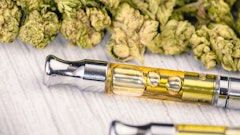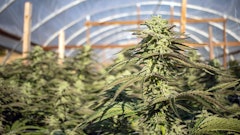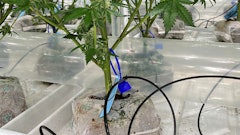
The U.S. Postal Service (USPS) updated its “Hazardous, Restricted, and Perishable Mail” policy June 6 to provide new mailing standards for products derived from cannabis and industrial hemp.
According to its website, the USPS has received numerous inquiries from both businesses and consumers looking to use its services to transport CBD products. In its recent bulletin, the USPS clarified that the 2014 Farm Bill, which authorized states to implement hemp cultivation programs, as well as the 2018 Farm Bill that federally legalized the cultivation and sale of hemp, allow the USPS to ship some products derived from industrial hemp, under specific conditions.
A business that wishes to ship those products must have a license from its state’s Department of Agriculture to produce industrial hemp, according to USPS policy, and the THC concentration of any product mailed must not exceed 0.3 percent. Once the 2018 Farm Bill is fully implemented and states begin to regulate hemp and hemp-derived products, the USPS will further amend its policy on the transport of hemp and hemp-based products, according to the bulletin.
Those businesses are responsible for complying with all laws and regulations that govern mailability, the USPS said. While they are not required to present documentation proving state licensure and THC content at the time of mailing, this documentation may be requested should there be doubt about the item’s mailability or the addressee’s ability to legally receive it.
High Falls Hemp, a New York-based hemp-derived product manufacturer, has been shipping with the USPS for over a year, according to Managing Director Sheila Doyle. The company only ran into an issue once, Doyle said, when a particular post office branch had a misunderstanding of hemp products.
“They questioned ‘how we knew it would not blow up on an airplane,’ so clearly they were assuming that all hemp-CBD products were vapes,” Doyle said. “This is not the case as we do not sell vapes. They also told us it needed to be packed in a special way, so at the time it was a little confusing.”
High Falls Hemp employees now carry the required documents to show the USPS that the company’s products are compliant, should a question arise, Doyle said. “Our products also have QR codes on them that lead to a web page containing the third-party lab reports on each product. That will also make it easier to show anyone what is in the product and the proper low-level of THC.”
Recently, High Falls Hemp shipped hemp seeds internationally, and although other carriers declined the shipments, the USPS accepted them after reviewing the required documentation.
“It is a big deal for the industry to be able to ship via USPS, and I also think it is a great move for the USPS to get in on the ground floor by accepting this industry,” Doyle said.
The USPS’s new guidelines for hemp and hemp-derived products are part of a larger industry trend that has been evolving over the past couple of months with the normalization of the market, according to Lex Pelger, director of education at CV Sciences, a producer of cannabis-based products.
“I think this is a big deal,” Pelger told Cannabis Business Times. “That’s really important, to have these kinds of clarifications, to have the USPS say, ‘This is completely legal.’ It does matter, and you see other agencies following suit in their various departments.”
The Transportation Security Administration (TSA), for example, updated its policy last month to allow travelers to bring certain CBD products on flights.
“I think that the USPS stepping up to clearly lay out their policy was wise given the movement towards the acceptance and legalization of hemp in the U.S. post 2018 Farm Bill,” said Jason Mitchell, co-founder and president of Hemp Fusion, a provider of hemp-based products. “This move also provides additional support for this movement and thus helps to create a sense of acceptance by other organizations.”
Now that the USPS has updated its hemp and CBD policies, Pelger sees it as positive for not only hemp- and CBD-related businesses, but also shipping businesses, like the USPS, which will now have more packages to send around the country.
“It might be a drop in the bucket compared to all the packages shipped in the United States, but it’s one more category of product that’s going to be shipped a lot more,” Pelger said.
Although CV Sciences ships its products through UPS, Pelger has previously worked at companies that used the USPS, and he has never seen any major issues arise with either of these major carriers when transporting hemp and hemp-derived products.
“Because they’re such a normalized product and they just simply look like another plant extract, in general, it doesn’t seem like it’s raising red flags,” he said. “Often, I would suspect people don’t even know or care what’s in there. It doesn’t seem like they’re looking for it.”
Even so, businesses and consumers have historically been fearful of shipping these products through the mail due to the regulatory gray area, Pelger said. Now that the USPS has clarified its policy to definitively allow the shipment of these products, it will allow industry stakeholders to breathe a sigh of relief.
“When I’m out on the road, I hear a lot of elderly folks, especially, being worried about this being shipped to their house, being worried about legality, being worried about their insurance companies,” Pelger said. “To have a statement like this to let them rest easy … means there are going to be a lot more grandmothers or parents around the country who are finally going to feel safe enough to buy a hemp extract online and have it shipped to their house. And that could be a really important thing for their health.”
For companies shipping hemp and hemp-based products, it should be business as usual, Pelger said, although businesses should read the USPS’s guidelines very carefully and be aware of some kinks that need to be worked out.
“They’re not simple,” he said. “It involves three different prongs: a self-certification statement, a license issued by that state’s Department of Agriculture, and then saying that [the hemp or hemp-derived product contains] less than 0.3-percent THC. What the USPS actually said is kind of confusing and doesn’t quite make sense with how some of the industry works because for some companies, like ours, we don’t have a license from any local department of agriculture because none of our hemp is grown in the United States. We’re using only Dutch hemp, and so we don’t need to deal with the USDA for growing hemp. So, we wouldn’t have a license from them, and it’s something that’s required.”
Companies in the space should also be mindful of local authorities who may not align with the USPS policy, or the USDA’s recent memo clarifying that hemp can be legally transported across state lines.
“Even though they’re saying this is true, there are still shipments being seized in the country, like in Idaho, for perfectly legal hemp shipments going through,” Pelger said. “The local cops don’t like it, and even though it’s legal under the federal law, it’s months and months of back and forth to try to get back their plants.”
Indeed, the case of Denis Palamarchuk, who was transporting hemp through Idaho on his way from one licensed company to another earlier this year when police officers asserted he was carrying illegal marijuana through the state, demonstrates federal and state tension that law enforcement authorities and agricultural regulators have been wrestling since the passage of the 2018 Farm Bill.
Even so, Pelger said the USPS memo offers some much-needed clarity that can be amended as more guidelines are handed down from other applicable federal agencies. “This new memo is a great step in the right direction, but as it says on the issuing statement, this is a memo subject to change. So, they’re still working out what exactly this needs to look like, but you can tell that they’re working hard to try to do their best to be on the right side of the 2018 Farm Bill and where all these laws are moving."

























